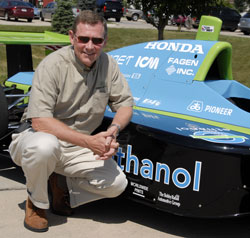 As summer officially begins, events in Iowa to promote and expand the use of E85 are shifting into high gear.
As summer officially begins, events in Iowa to promote and expand the use of E85 are shifting into high gear.
The American Lung Association of the Upper Midwest reports that Iowa Governor Chet Culver and Lt. Governor Patty Judge will address a workshop at Wallace Auditorium in Des Moines for 100 managers and directors of state-owned vehicle fleets on Thursday, “E85: Kicking the Oil Addiction.” The workshop was developed for the Iowa state agencies by the American Lung Association of the Upper Midwest, on behalf of the National Renewable Energy Laboratory and the U.S. Dept. of Energy’s Energy Policy Act Program.
In addition, E85 stations across the state are offering discounted fuel today in honor of the Iowa Corn Indy 250 in Newton on Sunday, June 24.
Kum and Go is offering E85 at $1.85 per gallon from 9 a.m. to 3 p.m. at stores in Ames, Ankeny, Clear Lake, Coralville, Grinnell, Johnston, Lamoni, and West Des Moines.
 An additional group of stations is selling E85 at 85 cents below their posted price from 11 a.m. to 1 p.m. in Council Bluffs, Dubuque, Durant, Estherville, Farnhamville, Fort Dodge, Keota, Mapleton and Roelyn.
An additional group of stations is selling E85 at 85 cents below their posted price from 11 a.m. to 1 p.m. in Council Bluffs, Dubuque, Durant, Estherville, Farnhamville, Fort Dodge, Keota, Mapleton and Roelyn.
Besides E85, which can only be used in flex-fuel vehicles, the Ethanol Promotion and Information Council is sponsoring pump promotions on E10 around the state prior to the race on Sunday. Promotions are being held Thursday in West Des Moines and Grinnell, and Friday in Newton.
 You can see the interest Pioneer Hi-Bred has in this weekend’s Iowa Corn Indy 250 as you drive in to Iowa Speedway.
You can see the interest Pioneer Hi-Bred has in this weekend’s Iowa Corn Indy 250 as you drive in to Iowa Speedway.

 Once again yesterday the ethanol logo was flying high.
Once again yesterday the ethanol logo was flying high. The Iowa Corn Growers just held a press conference here at the Iowa Speedway to unveil the trophy for Sunday’s Iowa Corn Indy 250. It’s a tall good looking trophy.
The Iowa Corn Growers just held a press conference here at the Iowa Speedway to unveil the trophy for Sunday’s Iowa Corn Indy 250. It’s a tall good looking trophy. Here’s some of the reasons why the Iowa Corn Growers is involved and supporting this inaugural race:
Here’s some of the reasons why the Iowa Corn Growers is involved and supporting this inaugural race: One of the people attending the ethanol pump promotion in West Des Moines was
One of the people attending the ethanol pump promotion in West Des Moines was  At today’s Kum & Go pump promotion I got a chance to interview IndyCar driver Jeff Simmons once again. Jeff was on hand to pump ethanol enriched gas for customers during this midday promotion.
At today’s Kum & Go pump promotion I got a chance to interview IndyCar driver Jeff Simmons once again. Jeff was on hand to pump ethanol enriched gas for customers during this midday promotion. Here’s the fine looking group of volunteers who worked on a hot day to pump and promote ethanol to consumers out here at the West Des Moines Kum & Go.
Here’s the fine looking group of volunteers who worked on a hot day to pump and promote ethanol to consumers out here at the West Des Moines Kum & Go. Since Cindy mentioned that
Since Cindy mentioned that  As summer officially begins, events in Iowa to promote and expand the use of E85 are shifting into high gear.
As summer officially begins, events in Iowa to promote and expand the use of E85 are shifting into high gear.  An additional group of stations is selling E85 at 85 cents below their posted price from 11 a.m. to 1 p.m. in Council Bluffs, Dubuque, Durant, Estherville, Farnhamville, Fort Dodge, Keota, Mapleton and Roelyn.
An additional group of stations is selling E85 at 85 cents below their posted price from 11 a.m. to 1 p.m. in Council Bluffs, Dubuque, Durant, Estherville, Farnhamville, Fort Dodge, Keota, Mapleton and Roelyn.
 Usually, you see votes in the Senate split along party lines, but this one had more of a regional feel to it as Midwestern Senators sided with protecting their homegrown ethanol. Plus, the corn-rich, and thus ethanol-rich, Midwest would continue to enjoy the 51-cent-a-gallon federal ethanol incentives. The Senate ended up voting 56-36 to reject a procedural move that was needed to add the tariff repeal to a pending energy bill.
Usually, you see votes in the Senate split along party lines, but this one had more of a regional feel to it as Midwestern Senators sided with protecting their homegrown ethanol. Plus, the corn-rich, and thus ethanol-rich, Midwest would continue to enjoy the 51-cent-a-gallon federal ethanol incentives. The Senate ended up voting 56-36 to reject a procedural move that was needed to add the tariff repeal to a pending energy bill.